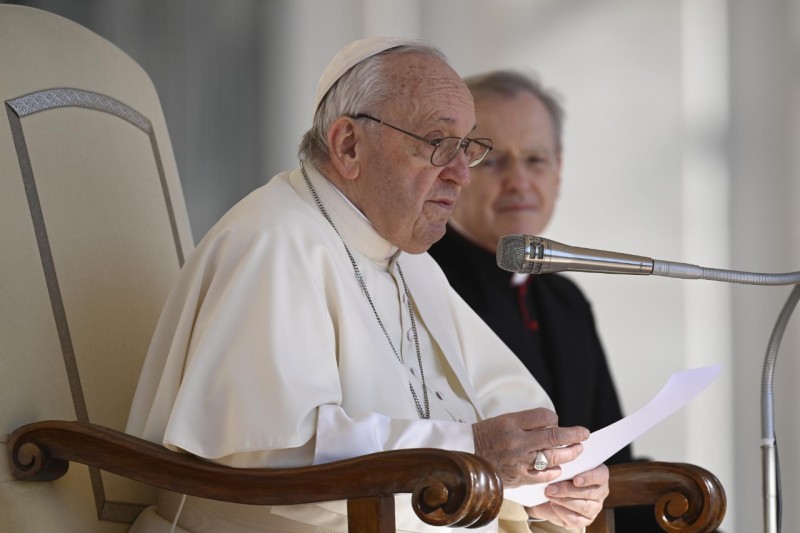Pope Francis urged Catholics on Wednesday to rediscover a book of the Bible that offers “valuable teaching on the alliance of the generations.”
In his general audience address on April 27, the pope praised the Book of Ruth’s positive depiction of relations between a woman and her mother-in-law.
“I invite you to rediscover the Book of Ruth. Especially in the meditation on love and in catechesis on the family,” he said.
“This short book also contains valuable teaching on the alliance of the generations: where youth shows itself to be capable of restoring enthusiasm to mature age — this is essential: when youth restores enthusiasm to the elderly — and old age discovers it is capable of reopening the future to wounded youth.”
The live-streamed catechesis was the seventh in a cycle on old age that the 85-year-old pope began in February. His own advanced age was apparent at the start of the audience as he walked slowly and with assistance to his white chair on a raised platform in St. Peter’s Square.
The pope, who was forced to cancel engagements on Tuesday due to knee pain, remained seated at the end of the audience to greet individual pilgrims, rather than taking his customary walk among them.
“I apologize if I’m going to greet you while sitting, because this knee is still not healing and I can’t stand that long,” he explained. “Please excuse me for this.”
The pope was speaking for the second time this week about the Book of Ruth. On Monday, he reflected on the four-chapter book in the Hebrew Bible in an address to Missionaries of Mercy.
On Wednesday, he focused on the relationship between Ruth, a Moabite woman, and Naomi, her elderly Israelite mother-in-law. When Ruth’s husband died, Naomi encouraged her to return to her people, but Ruth decided to stay among the Israelite people and, with Naomi’s blessing, married a man called Boaz.
“Look how many ‘miracles’ accompany the conversion of this elderly woman,” the pope said. “She converts to the commitment of making herself available, with love, for the future of a generation wounded by loss and at risk of abandonment.”
“The points of reconstruction are those that, on the basis of the probability drawn by commonplace prejudices, ought to generate insuperable fractures.”
“Instead, faith and love enable them to be overcome: the mother-in-law overcomes her jealousy for her own son, loving Ruth’s new bond; the women of Israel overcome their distrust of the foreigner (and if women will do it, everyone will); the vulnerability of the lone girl, faced with male power, is reconciled with a bond full of love and respect.”
The pope then urged pilgrims to strengthen their relationships with their own mothers-in-law.
He noted that mothers-in-law were often depicted as “unpleasant” figures.
“But the mother-in-law is your husband’s mother, she is your wife’s mother,” he said. “We think today of this somewhat widespread sentiment that the further away the mother-in-law is the better. No! She’s a mother, she’s elderly.”
“One of the most beautiful things about grandmothers is seeing the grandchildren — when their children have children of their own, they come alive again. Take a good look at the relationship you have with your mothers-in-law: sometimes they are a bit special, but they have given you the motherhood of your spouse, they have given you everything. At least you must make them happy, so that they may carry on their old age with happiness. And if they have any defects, you have to help them correct themselves.”
“And to you, mothers-in-law, I say: be careful with your tongue, because its misuse is one of the worst sins of mothers-in-law. Be careful.”
Concluding his reflection, he said: “If the young open themselves to gratitude for what they have received, and the elderly take the initiative of relaunching their future, nothing can stop the flourishing of God’s blessings among peoples.”
“I recommend that the young talk to the grandparents, that the young speak to the old, that the old talk to the young. This bridge must be rebuilt in a strong way — there is a current of salvation, of happiness there.”
“May the Lord help us, doing this, to grow in harmony with families, that constructive harmony that goes from the oldest to the youngest, that beautiful bridge that we must protect and safeguard.”







